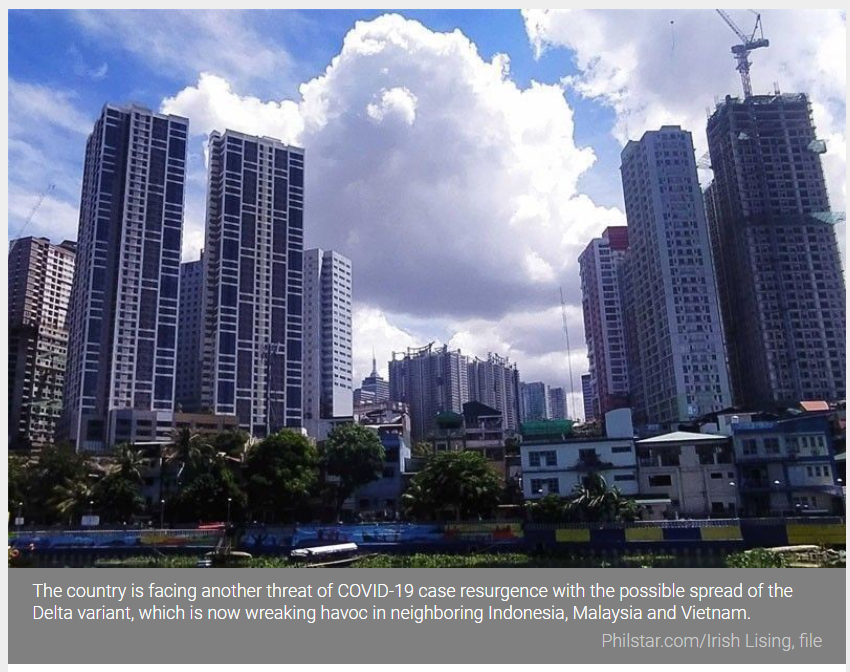Philippine economy to suffer if Delta variant spreads
MANILA, Philippines — The Philippine economy will be at the losing end anew once the Delta variant infects more people and prompts the government to impose another round of strict lockdown measures, highlighting the need to expedite COVID-19 vaccination in the country, economists said.
The country is facing another threat of COVID-19 case resurgence with the possible spread of the Delta variant, which is now wreaking havoc in neighboring Indonesia, Malaysia and Vietnam.
The Department of Health earlier reported new local cases of the Delta variant, considered as the more dangerous and more transmissible strain of COVID-19.
ING Bank senior economist Nicholas Mapa expressed concern over the likelihood of another surge and its impact on the economy that has yet to see sustained green shoots of recovery.
“If another round of acceleration in infections, similar or even more severe than the Alpha variant-induced spike in March were to be felt, we may have to return to debilitating lockdowns once again,” Mapa said.
“From there, we are well aware of the negative impact on growth and we will likely downgrade our already pessimistic outlook for 4.7 percent GDP (gross domestic product) on account of the projected slowdown,” he said.
Union Bank of the Philippines chief economist Ruben Carlo Asuncion, for his part, said the already precarious state of economic recovery will definitely suffer if the Delta variant spreads like wildfire.
“Although I believe that the country’s healthcare system can cope based on the previous wave, this type of spread is the last thing that the ailing economy needs,” Asuncion said.
The National Economic and Development Authority (NEDA) is also recognizing the higher risk posed by the Delta variant.
But Socioeconomic Planning Secretary Karl Chua said this can be better managed by guarding the country’s borders and enforcing health standards, as well as imposing localized lockdowns in areas of transmission, rather than placing the entire country or large areas in a higher level of quarantine.
“The far majority of people comply with health standards and need to work to address their hunger and other non-COVID-19 health concerns,” Chua said.
As to whether the country is better prepared this time should the situation get worse due to the Delta variant, Chua said “accelerating vaccination is key to our preparedness.”
Mapa said the government should speed up vaccination to about 760,000 doses per day from the current 350,000 level and ensure that supply is consistent.
“It is difficult, but doable. But the sheer difference in numbers shows how much faster we need to be doing this,” he said.
Latest government data showed that only 15.1 million doses have been administered since vaccination started in March.
About 4.3 percent or 4.71 million Filipinos have been fully vaccinated while those who were given at least one dose reached 10.34 million or some 9.5 percent of the population.
Compared to the situation in March and April, Mapa said more vaccines are now deployed across the country which should help mitigate the situation.
On the flip side, however, he said the NCR Plus bubble has burst already, which means mobility is now higher.
“Based on the Indonesia case, the Alpha spike was nothing compared to the Delta spike of 50,000 plus a day. So, we have the odds stacked against us,” Mapa said.
The Foundation for Economic Freedom said the Delta variant can be contained if more vaccines will be administered, especially in Metro Manila and surrounding regions. This will also lessen possible economic damage.
FEF president Calixto Chikiamco said the government should be better prepared by now after the resurgence in March.
“But, if the government acts too late, even the expanded healthcare capacity won’t be enough if the virus is allowed to exponentially spread,” Chikiamco said.
On the other hand, UK-based Pantheon Macroeconomics emphasized that the situation in the country remains fragile as case count is still sticky or slow to change, at around 45 percent of the mid-April peak.
Test-positivity rate also continues to hover dangerously in the low double-digit range.
“For now, though, the ongoing, if gradual, increase in the mobility indicators for India and the Philippines lies in stark contrast to the rolling back of near-normality in other emerging markets,” Pantheon said.
Source: https://www.philstar.com/business/2021/07/20/2113653/philippine-economy-suffer-if-delta-variant-spreads


 Thailand
Thailand




